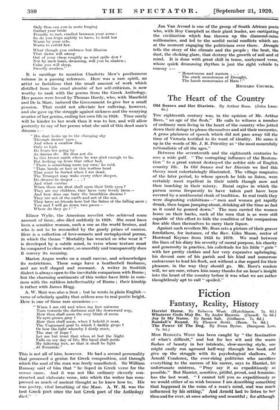The Heart of the Country
THE eighteenth century was, in the opinion of Mr. Arthur Rees, " an age of the flesh." He calls to witness a number of ordinary men living in the heart of the country who jotted down their doings to please themselves and aid their memories. A gross plainness of speech which did not pass away till the time of Victoria testified to its want of ideality. He sums it up in the words of Mr. J. B. Priestley as " the most mournfully rationalistic of all the ages."
Between the seventeenth and the eighteenth centuries he sees a wide gulf. • " The corrupting influence of the Restora- tion " to a great extent destroyed the nobler side of English country life. In Old Sussex and her Diarists we find this theory most entertainingly illustrated. The village magnates of the later period, to whose speech he bids us listen, were certainly most repellent in their mirth though now and then touching in their misery. Rural orgies in which the parson seems frequently to have taken part have been covered by a sentimental cloak of tradition. In real truth they were disgusting exhibitions—" men and women get rapidly drunk, then began jumping about, drinking all the time as fast as it could be poured down." The men carried the women home on their backs, such of the men that is as were still capable of this effort to hide the condition of fair companions less able than themselves to carry their liquor.
Against such revellers Mr. Rees sets a picture of their graver forefathers, for instance, of the Rev. Giles Moore, rector of Horstead Keynes from 1655 to 1679. We read between the lines of his diary his severity of moral purpose, his charity and generosity in practice, his solicitude for his little " girle " with her pretty clothes and her very expensive upbringing, his devout care of his parish and his kind and numerous endeavours to lead his flock, not without a due regard for their pleasure, in the way they should go. Mr. Rees's readers will, we are sure, return him many thanks for an hour's insight into the heart of the country before it was what we are rather thoughtlessly apt to call " spoiled."












































 Previous page
Previous page